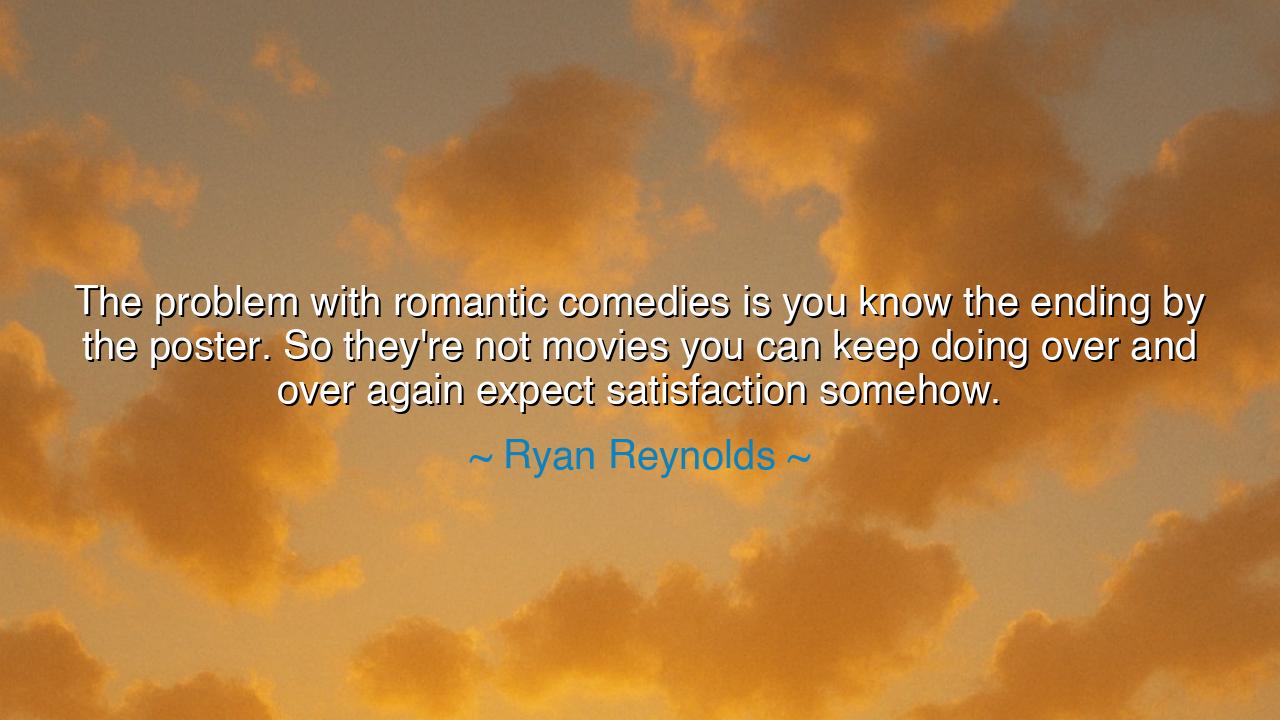
The problem with romantic comedies is you know the ending by the
The problem with romantic comedies is you know the ending by the poster. So they're not movies you can keep doing over and over again expect satisfaction somehow.






The words of Ryan Reynolds—“The problem with romantic comedies is you know the ending by the poster. So they're not movies you can keep doing over and over again and expect satisfaction somehow”—speak with candor about the challenge of storytelling, and even more deeply, about the human hunger for surprise, growth, and renewal. In them, he reveals that predictability is the enemy of true satisfaction. For what joy is there in a journey if the path is entirely mapped before the first step is taken? What triumph can stir the heart if the outcome was certain from the start?
The origin of this wisdom lies in the oldest traditions of narrative itself. In the epics of the ancients, whether Homer’s Odyssey or the Mahabharata of India, it was not only the endings that gave meaning but the unpredictable struggles, the unforeseen betrayals, and the sudden turns of fate that shaped the journey. The heroes may have sought home, honor, or victory, but their path was filled with uncertainty. It is this uncertainty that awakened wonder in the audience. Reynolds, in speaking of romantic comedies, identifies the danger of formula—that if the ending is already seen in the poster, the story loses the power to captivate, to make the heart truly believe in love’s struggle.
History itself gives us a striking example. Consider Caesar crossing the Rubicon. The end of his march might seem inevitable now to us, but to those living in that moment, nothing was certain. The risk was monumental, the outcome unknown. It was precisely this uncertainty that made his action unforgettable. A story whose end is carved before it begins does not live in the imagination; it dies before it breathes. Thus Reynolds’ critique is not only about film, but about art and life itself: the spirit craves not mere repetition, but risk and discovery.
In truth, the romantic comedy once held more surprise. Shakespeare’s comedies—though filled with mistaken identities, disguises, and lovers lost and found—kept audiences guessing until the final scene. Yet as time passed, the genre hardened into formula: a boy meets girl, a misunderstanding arises, a grand gesture resolves all, and love is sealed in a kiss. Though the heart may still find sweetness in such tales, the soul cannot be nourished if it always knows the feast before sitting at the table. Satisfaction comes not from certainty, but from suspense, the tremor of not knowing what comes next.
The lesson here is profound: whether in art or in life, beware the trap of repetition without renewal. To live the same patterns again and again without freshness is to dull the senses, to make even joy grow stale. Love itself must be more than a script; it must be alive, filled with risk, surprise, and growth. For what is love if not an ever-unfolding story, one whose ending is hidden even from those who walk it? Reynolds’ words challenge us to seek more than formula in both movies and our own lives.
Practically, this calls us to embrace unpredictability. In art, demand stories that challenge you, that lead you to unexpected places, that dare to break the mold. In life, resist the temptation to cling to certainty or routine alone. Allow space for adventure, for risk, for encounters that may not end as expected but that shape the soul in new ways. Just as the greatest stories are those whose endings cannot be read from a poster, so too the greatest lives are those whose outcomes are not predetermined but discovered along the way.
Thus, Reynolds’ critique is more than about cinema—it is about the essence of human longing. We do not truly crave the comfort of certainty; we crave the wonder of discovery. Predictability may soothe, but unpredictability awakens. To be satisfied, we must allow ourselves to enter into stories, and into lives, where endings are not handed to us in advance but must be earned, discovered, and cherished.
So let this teaching endure: do not seek only the safety of known endings, whether in films or in your own path. Seek instead the beauty of the uncertain, for it is there that the soul is tested, and there that true satisfaction is found. A life, like a story, must hold surprises if it is to be worth telling.






AAdministratorAdministrator
Welcome, honored guests. Please leave a comment, we will respond soon